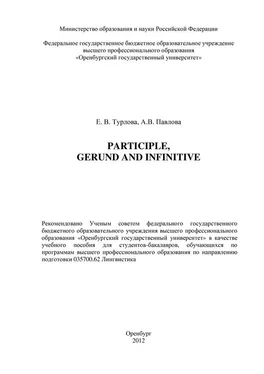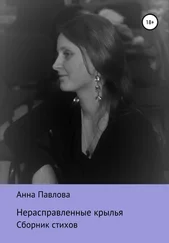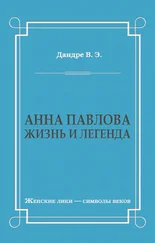3. generally speaking; taking everything into consideration; putting it mildly, judging from experience; strictly speaking.
B. 1. I him running; her saying; the clock ticking; the children laughing; somebody talking; you sitting; myself blushing.
1) they… talking; he… walking, he… driving; they…exchanging glances; she … walking.
2) the hour being early…; the clock striking eight…; it being a rainy day …; important point settled …; his eyes snapping at him …
Exercise 5. Make up sentences using the expressions given below. Pay attention to the diversity of the functions of participle II in the sentence.
1. a puzzled look; greeted by everyone; surrounded by his friends; written in block letters; received by yesterday's post.
2. seemed surprised; looked bewildered; sounded annoyed; felt disappointed; looked relieved.
3. a) each lost in her thoughts; startled and annoyed; carried away by his memories;
b) when asked; until punished; when surrounded by difficulties; when embarrassed; when recorded;
c) as if startled; as if annoyed; as if deeply impressed; as though finished.
Exercise 6. Develop the following sentences into situations. Read the suggested sentences containing the participle. Then make up at least one sentence to specify, prove or refute the given one. Follow the models.
Model: The boy ran out of the room, slamming the door behind him. – The boy ran out of the room, slamming the door behind him. He was angry with his sister and did not want to play with her.
1. She sat, leaning her head on her hands. 2. He smiled, noting the astonished expression on the faces of the others. 3. While working in the reading-room I take no notice of the time. 4. A puzzled look crossed his face. 5. Going home from school Mary ran ahead of her mother, swinging her bag and touching every lamp-post. 6. The girl sat over an algebra problem, sucking her pencil gloomily.
Model: I heard the telephone ringing and went to answer the call. – I heard the telephone ringing and went to answer the call It happened to be a friend speaking. I heard her voice trembling and understood that something was wrong.
1. They heard the door bell ringing. 2. She seemed slightly put out by my question, then she smiled. 3. I felt him looking at me now and then. 4. Mary thought she was grown up. Her chief theme at home was: "Mummy, when can I have my hair cut?" 5. She sat with her eyes fixed on the ground. 6. She could be heard chattering with her friend hour after hour.
Model: She was walking slowly, a faint smile twitching the comers of her mouth. – She was walking slowly, a faint smile twitching the corners of her mouth. Evidently she was remembering something very pleasant.
1. The child began to cry and sat dabbing blindly at the egg with her spoon, big tears rolling down her face on the plate. 2. She paused, her gaze questioning him. 3. The examination being close at hand, he began to worry. 4. His curiosity having got the better of fear, the child came up to the dog.
Exercise 7. Think of the situations where you can use the sentences given below.
1. He could feel his heart beating. 2. She came at last, hurrying across the road with her suitcase in hand. 3. He kept his eyes fixed on mine till I had finished, and then he turned away. 4. It set my heart leaping. 5. I heard him pacing up and down in his room long after the rest of the family had gone to bed. 6. At this instant my attention wandered to the four people sitting at the next table. 7. "Don't thank me," she said, folding her arms and frowning at him. 8. "It's marvelous, it's terrific," he said, announcing the news to his sister. 9. They went happily down the road, boasting, chattering, tired and relaxed and utterly happy. 10. He liked the way she had her hair arranged. 11. He laughed, then was silent. The conductor had appeared, greeted by mild hand clapping. 12. Nick looked on at the moon, coming up over the forest. 13. For some minutes they stood at the door shaking hands with their host. 14. Casting a look at her husband and his newspaper, she sniffed, and withdrew. 15. She sat dumbly through lessons, her head splitting. 16. He seemed making some signs to me. 17. The girl suddenly went crimson, blushing to the roots of her hair.18. Frankly speaking, I was wrong. 19. Putting it mildly, she is rather silly.
Exercise 8. Translate into English. Pay attention to the use of Participle I and Participle II.
1. Она прошла мимо него, делая вид, что смотрит перед собой. 2. Джим надел шляпу и вышел, хлопнув дверью. 3. Обернувшись, он уставился на меня, но я понял, что он меня не видел. 4. Обычно, проводив пациента до двери, он сразу шел обратно к своему столу. 5. Мисс Вотерфорд была хорошей хозяйкой и, видя мое замешательство, подошла ко мне. 6. Сдерживая слезы, так как она знала, что он их терпеть не может, она просила его быть благоразумным. 7. Какую ты ведешь роскошную жизнь, валяешься в постели до одиннадцати. 8. Дверь случайно оказалась полуотворенной, и я слышала, как она разговаривала с кем-то в коридоре.
9. Она могла чувствовать, как у нее сильно дрожат колени. 10. Я заметил, что на стене висят несколько картин, которых я никогда не видел раньше. 11. Через секунду Льюис выскочил из машины, его глаза горели от возбуждения. 12. Я увидел, как у него на лбу выступил пот. 13. Она уселась в кресло и сидела, наблюдая за ним. 14. Проходя мимо Театра Комедии, я случайно взглянул вверх и увидел облака, освещенные заходящим солнцем. 15. Я быстро взглянул украдкой на Марта и Джерри, сидящих в первом ряду, и увидел, что они улыбаются. 16. Он ехал медленно, наслаждаясь тишиной вечера. 17. Я услышал, как его голос дрожал от гнева. 18. Я видела, как она убежала в том направлении примерно четверть часа тому назад. 19. Издалека он увидел, как аптекарь ждет его на пороге с удивленным выражением на лице. 20. Освальд мог чувствовать, как бьется его сердце. 21. Я должен ее вылечить. 22. И вечером после чая…они сидели в гостиной, дамы вязали, а доктор Мэкфайл курил свою трубку.
Exercise 9. Translate the following sentences into Russian. Pay attention to Objective participial constructions.
1. Иностранные туристы с интересом наблюдали, как над Невой понимают мосты. 2. Никто не видел, как украли документ. 3. Пассажиры наблюдали, как взвешивали их багаж. 4. Кто-нибудь видел, как принесли этот пакет? 5. Я был так взволнован, что не заметил, как забили шайбу. 6. Наутро я обнаружил, что стекло в машине разбито, а замок взломан. 7. Я не хочу, чтобы этот вопрос обсуждался на вашем заседании. 8. Почему ты оставил машину грязной? 9. С удивлением она нашла посуду всю вымытой, а кухню убранной.
Читать дальше
Конец ознакомительного отрывка
Купить книгу












